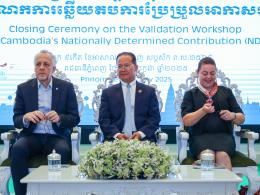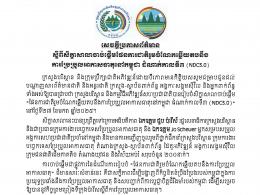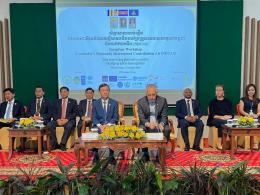 Phnom Penh, 27th September 2017, General Secretariat of the National Council for Sustainable Development (NCSD) and UNDP-Sida launched a second phase of the “Cambodia Component of the Regional Programme on Strengthening the Governance of Climate Change Finance to Enhance Gender Equality 2017-2022”, financially supported by Sweden at Raffles Le Royal Hotel. The programme focuses on strengthening the integration of climate change issues in the national budget, also taking into account gender and vulnerable groups. It will generate evidence on the links between climate investments and growth at a macro level and how climate investments affect vulnerable groups, including a gender perspective at micro level. From this evidence it will help demonstrate to decision-makers how investing in climate change adaptation and mitigation will deliver higher economic and social benefits.
Phnom Penh, 27th September 2017, General Secretariat of the National Council for Sustainable Development (NCSD) and UNDP-Sida launched a second phase of the “Cambodia Component of the Regional Programme on Strengthening the Governance of Climate Change Finance to Enhance Gender Equality 2017-2022”, financially supported by Sweden at Raffles Le Royal Hotel. The programme focuses on strengthening the integration of climate change issues in the national budget, also taking into account gender and vulnerable groups. It will generate evidence on the links between climate investments and growth at a macro level and how climate investments affect vulnerable groups, including a gender perspective at micro level. From this evidence it will help demonstrate to decision-makers how investing in climate change adaptation and mitigation will deliver higher economic and social benefits.
During the launch, H.E. Tin Ponlok, NCSD’s Secretary General, welcomed the new phase of this regional programme. He added that “while good progress has been made in these first few years, we also know that it takes time to upgrade Government systems and build the capacities required to operate these systems […] we need to have a critical mass of staff who are familiar with climate change issues, understand the implications in their sector, and are able to translate this into meaningful budget proposals”.
Mr. Nick Beresford, UNDP country director, considered this regional programme as a very strategic engagement and important work for UNDP, as “UNDP is here to help build national capacities and systems that deliver the investments and services that Cambodian people need to develop in a sustainable and inclusive manner”.
H.E. Maria Sargren, Swedish ambassador to Cambodia, noted that this programme aligns with three of the main priorities of Sweden in its cooperation with Cambodia, namely climate change, gender, and public financial management systems. The regional approach provides a platform to share innovative tools and practices across coutnries. She highlighted the higher impact of climate change on women and vulnerable groups, and insisted on the need to involve these groups and reflect their needs in public policies and public investments.
Under the regional programme over the past three years, General Secretariat of the NCSD has worked closely with Ministry of Economy and Finance to integrate climate change into Government’s planning and budgeting systems from three main angles:
- Improving capacity at MEF level to track the allocation of climate finance, understand its costs and benefits, and issue clear guidance to ministries as part of the budget process. As a result, for the past two years, climate change guidance has been included in budget circulars, and Climate Public Expenditure Reviews have been regularly conducted and published by MEF
- Focusing on key line ministries such as MAFF, MOWRAM, MPWT and MRD to analyze their budget submissions, identify where a climate change lens needed to be integrated, and helped them to conduct cost-benefit analysis of key projects, taking into account the impacts of climate change. This analysis provided evidence to support climate-proofing of key projects during budget negotiations;
- Focusing on capacity development, and establishing training capacity in country on climate finance issues through partnership with UNITAR and the Economics and Finance Institute to develop and deliver tailored courses for Cambodian civil servants, both online and through face-to-face events.
The added value of the regional programme in its partnership with Cambodia Climate Change Alliance (CCCA) is that it brings expertise and experience from other countries, which can be called upon when there is no full-time expertise in country, for example for methodologies for tools like the climate public expenditure reviews, or the climate change budget integration index.
The launch was presided over by H.E. Tin Ponlok, NCSD Secretary General, with H.E. Maria Sargren, ambassador of Sweden and Mr. Nick Beresford, UNDP Country Director with over 40 participants from government ministries/agencies, development partners, NGOs and research institution.




